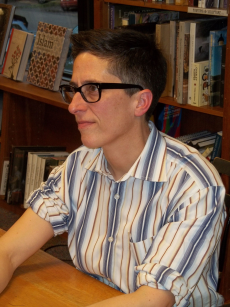
Alison Bechdel’s Fun home is an autobiographical graphic novel which centres on Bechdel’s childhood and family. It particularly focuses upon her and her father’s homosexuality and how the repression of his sexuality by attempting to create the ideal family home eventually leads to his tragic suicide. However, it is also not without its comic moments.
Illusion of a Family Life
Bechdel in the opening pages compares her father to a number of film and literary figures, one of which is Jimmy Stewart from “It’s a Wonderful Life”. This parallel is drawn because both Stewart and her father restore “a big old house and raise their family there”.
However, whereas Stewart’s refurbishment of an old house is for the purpose of providing for his family, Bechdel suggests that her father refurbished the 19th century house for its own creative sake. This is shown by the way in which he is constantly trying to make improvements to the house, its interior, its exterior, as well as the garden. It is particularly revealed by how her father “was indifferent to the human cost of his projects,” as Bechdel puts it.
Her father’s focus upon the aesthetic of his house illustrates his incessant need to make the house look like a family home, the Christmas tree placed just right, the mirrors placed parallel to the walls. Bechdel states how she “grew to resent the way my father treated his furniture like children, and his children like furniture.” It is as if he wants to create the illusion of a “Fun Home” in which inhabits a happy family than the real thing. Even the ironic title of the graphic novel with fun being short for “Funeral” is illusory.
Yet when Bechdel comes out to her parents, she starts to realise why her father could never be part of a real family home and that by creating the aesthetic of one, he could fool his children, friends and relatives and he could even attempt to hide the truth of his sexuality and the farcical nature of a heterosexual life from himself.
The action of coming out is often portrayed as a liberating event for oneself and one’s identity, and sometimes shown in a melodramatic light. However, when Bechdel reveals to her parents that she is a lesbian she experiences neither a sense of liberation nor a sense of melodrama, due to the fact that she then learns of her father’s homosexuality and had had affairs with men and even boys. “I’d been upstaged, demoted from protagonist in my own drama to comic relief in my parents’ tragedy.” This theatrical metaphor reveals to us how antithetical her experience of coming out was compared to the popular stereotype.
Due to being part of her father’s illusion of an ideal family life, a moment of independence and assuredness for Bechdel has been turned on its head, into a moment of uncertainty and shock. Not only does she not feel more independent, she feels more entrapped by her parents than before, stating that at the time she felt like she'd been “pulled back into their orbit.”
Image: By Michael Rhode (101_3633 Alison Bechdel) [CC BY 2.0 (http://creativecommons.org/licenses/by/2.0)], via Wikimedia Commons

0 Comment:
Be the first one to comment on this article.